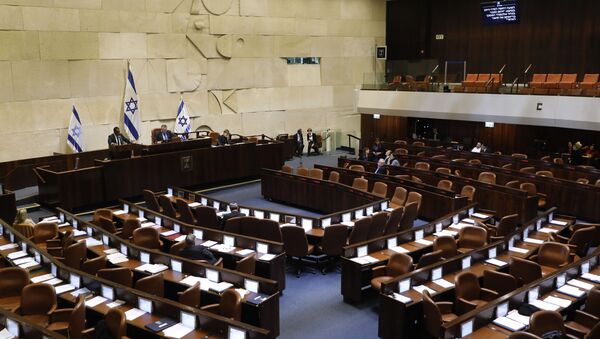After 21 days of failed negotiations, Israel's unicameral parliament announced Wednesday that it would be dissolving the 22nd Knesset and holding a new parliamentary election on March 2, 2020.
"The Knesset plenum passed in a preliminary reading the bill to dissolve the 22nd Knesset and hold elections for the 23rd Knesset on March 2, 2020," read the parliament's statement. "The final votes on the legislation are expected to take place before midnight [22:00 GMT]."
With its dissolution, the 22nd Knesset, less than three months old, holds the rank of the shortest-lived parliament in the country's history.
Israeli Prime Minister Benjamin Netanyahu took to Twitter Wednesday evening to provide his opinion as to why yet another election will take place in less than 90 days.
“They tried to do everything to establish a minority government with the terror supporters [Joint List MKs] Ayman Odeh and Ahmed Tibi, and they failed at that, too,” he said, according to a translation by the Jerusalem Post. “They forced new elections on us. It is unnecessary and in order to avoid it happening again there is one thing to do and that is to win, and win big – and that is what we’ll do.”
כחול לבן כפו עלינו בחירות חדשות. כדי למנוע שזה יחזור על עצמו עוד פעם יש רק דבר אחד לעשות: לנצח בגדול - וזה בדיוק מה שנעשה! pic.twitter.com/SgnQ46m5e0
— Benjamin Netanyahu (@netanyahu) December 11, 2019
Lawmaker and Blue and White alliance co-chairman Yair Lapid contended that the new parliamentary elections “only have three reasons: bribery, fraud and breach of trust,” reported the JPost. The three reasons listed by the MK parallel the charges leveled against Netanyahu as the result of a corruption probe.
Lapid went on to express that elections within the country are no longer a "celebration of democracy," but instead a "moment of shame" for the Knesset.
Blue and White chief Benny Gantz also placed blame on Netanyahu and asserted the third election cycle was taking place due to the prime minister's "attempt to obtain immunity" in his corruption case.
Though negotiations pertaining to choosing a prime minister fell through, Netanyahu's Likud party and Blue and White did come to an agreement regarding the then-tentative election date on Monday.
Following the September election, Likud and Blue and White were nearly neck-and-neck, with 32 and 33 parliamentary seats, respectively, but both were unsuccessful in reaching the 61-seat threshold needed to form a governing coalition in the Knesset.
That situation came about after an election in April which resulted in both Gantz and Netanyahu's parties winning 35 seats. Due to a greater number of endorsements from other parties, the prime minister was able to attempt to form a government, though he failed to do so.


